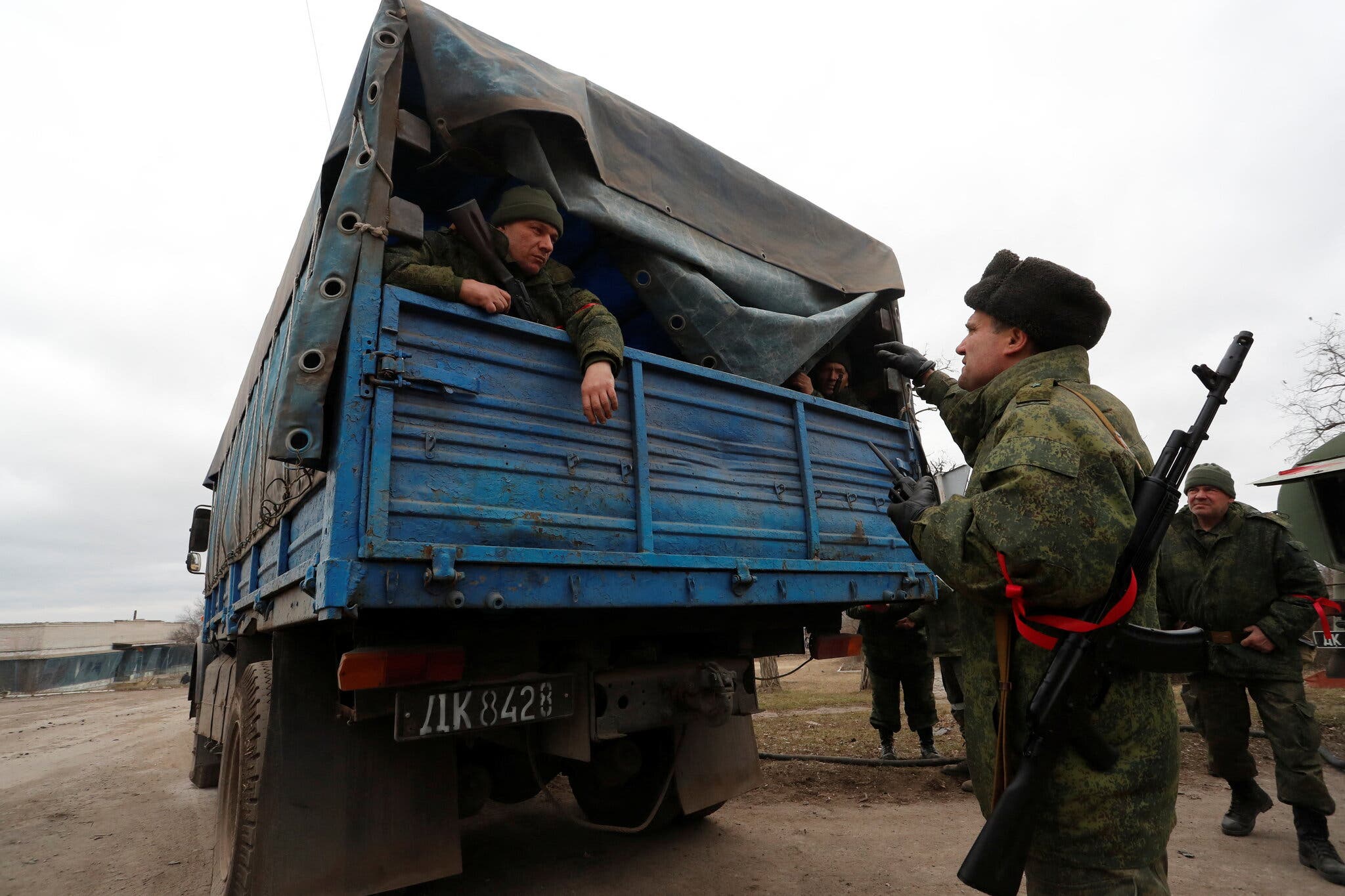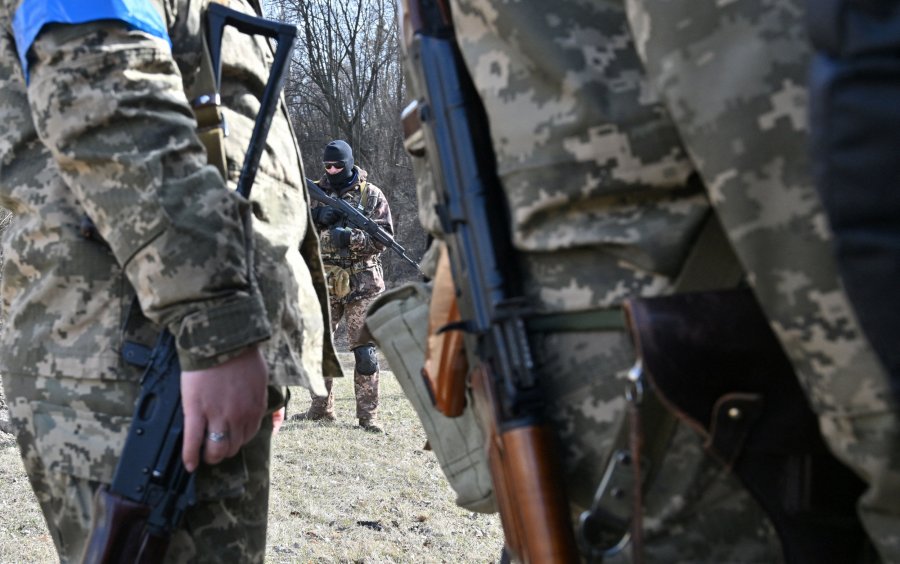Ukrainian soldiers stand guard at a checkpoint in the outskirt of Kyiv on March 28, 2022. Kyiv says former Russian troops who were captured are being trained to fight for Ukrainian forces. (SERGEI SUPINSK/GETTY IMAGES)
Russian President Vladmir Putin’s invasion of Ukraine has caused rippling effects throughout the world.
But not everyone understands it, and not everyone understands international politics, let alone national politics. Slice of Culture brought on Journalist, Socialist and Code Pink’s Weekend Social Media Manager Sam Carliner for a conversation on the Russia-Ukraine war.
Carliner is also a writer for Left Voice, a socialist publication, and has had his work published in Teen Vogue and Common Dreams, to name a few. He also wrote an opinion piece of Julian Assange for Slice of Culture in October of 2020.
In the first three parts, Carliner gave the background of how history between Ukraine and Russia played a huge part in the invasion, dove further in-depth on the ongoing attacks and explained why Russia is so threatened by Ukraine potentially joining NATO.
In Part 4, Carliner talks about how Americans and the international community can highlight the stories of the Russian anti-war movement — in hopes for a path to end the war.
Friday marked the 44th day of the invasion.
A Russian ballistic missile hit a crowded train station in an eastern Ukraine city, Kramatorsk, while 4,000 people were waiting to be evacuated mid-morning on Friday. The hit left at least 50 people, including five children dead, Donetsk Governor Pavlo Kyrylenko said via The Guardian.
Russia denied it was responsible. Ukrainian President Volodymyr Zelenskiy accused Russian forces of purposely targeting civilians, adding that no Ukrainian troopers were at the train station.
While the number of casualties fluctuates, American officials said last month that the Russian death toll is at more than 7,000, according to The New York Times. As for Ukrainian civilian casualties, the number is at 1,611 with 131 being children, according to Statista.
On Thursday, The Wall Street Journal reported that many Belarusian and Russian fighters have joined Ukraine’s military in hopes for a path to freedom.
Related:
RUSSIA-UKRAINE WAR: BREAKING DOWN HOW WE GOT HERE
RUSSIA-UKRAINE WAR: INSIDE THE INVASION
RUSSIA-UKRAINE WAR: WHY IS RUSSIA SO THREATENED BY NATO?
Adrienne:
But like I said, it is important to talk about these things, learn about these things because in a way it does impact us Americans.
So with that, why should Americans care? Because you know, a lot of Americans, they don’t even know much about international news because they think it doesn’t affect them.
So how does this affect an American/why should an American care?

Sam:
I appreciate you asking that.
I mean, first of all, we’ll just start with the moral standpoint, like everyone should oppose war. It’s just an awful thing to subject anyone to… I do believe that most people who are engaging in this conversation right now because they genuinely do care and not just for their own self interest.
Why I got interested in foreign policies [is because] that everything the US does ripples throughout the world.
Sam:
I mean we have 800 foreign bases, so we do dictate a lot of things through just having a military that like no other country compares to in terms of its presence around the world.
And then economically the US is able to shape a lot of countries’ economies through these international institutions and through its control of this globally connected economy.
So I think it’s important for people to understand that like every single decision the United States makes has consequences for the whole world. And when the whole world is impacted by something that always ends up, rippling back to us… It impacts geopolitics all over the world. Those end up coming back to us, we react in a way that causes re-starts the cycle again.
And I think it’s important that, if we want to live in a staple international world, we need to break that cycle.
Adrienne:
Got it. And so ending on a, I guess, more positive note… what are some ways to help? What do you think is the call to action?
Sam:
I will say that I think if anyone is going to succeed at stopping Putin from waging this disgusting war, it’s going to be the people of Russia. And we’re already seeing that.
Of course the reporting isn’t coming through as much as I think it should, both, I think because of censorship in Russia, as well as I think just in general, the US responding in my opinion, pushing less good policies, but essentially there is a very quickly forming anti-war movement within Russia that is challenging Putin.
These are, I mean, even from the average Russian worker to even people in Putin’s circles, there is an opposition to what he’s doing within Russia.
One thing that’s particularly interesting, there’s a lot of reports of Russian troops who are really questioning why they’re being sent to attack their neighboring country, who a lot of them have like friendships with because it’s their neighboring country.

Sam:
And there’s now dissent within the ranks of the Russian military that seems to be forming. And so, yeah, I think if this war’s gonna stop, it’s gonna be that Russian opposition that is in the best position to do it.
And so I think the international community should really support that opposition – really highlight their stories, their protests.
If you see a thing about a Russian troop refusing to fight, these people should know that the international [community] sees them and empowers them to keep taking those really brave stands that they’re taking. And I think that we should join them.
I think that it’s hard to just get people into the streets to oppose a war, but like to the extent that that’s possible, I think if people are like out in the streets trying to oppose this war, the message shouldn’t be for NATO intervention or sanctions, which risk prolonging and escalating the war, the call should be for, “We stand in support with the Russian anti-war movement and we are going to like follow your lead in opposing this war.”
That’s what I think is the best approach for people to take.











